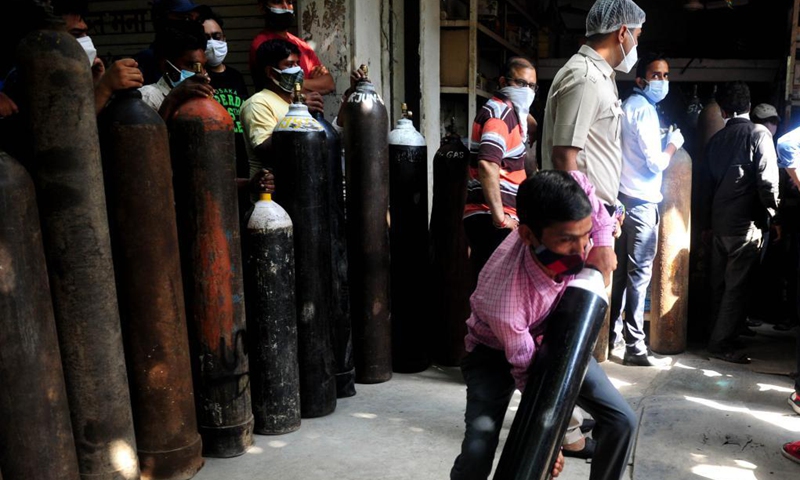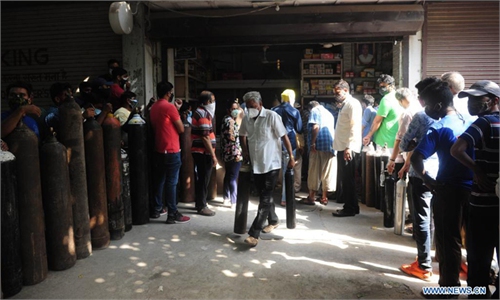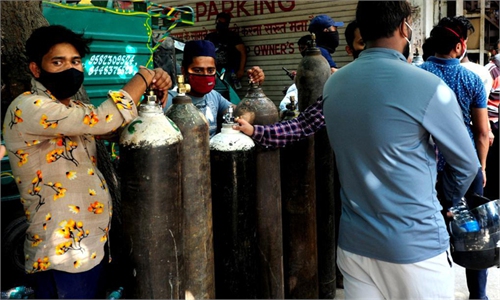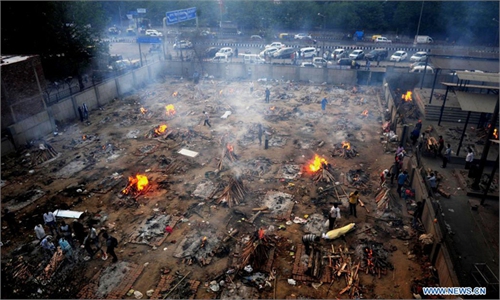COMMENTS / EXPERT ASSESSMENT
Indian economy looks increasingly bleak with ferocious virus resurgence

A man lifts a refilled medical oxygen cylinder for COVID-19 patients in front of a shop in New Delhi, India, April 26, 2021. (Photo: Xinhua)
While India's ferocious COVID-19 resurgence is shocking the world, some institutions have started to review their estimation for Indian GDP in the 2021-22 fiscal year, with Oxford Economics lowering India's growth to 10.2 percent from 11.8 percent.
The true challenge facing India now is whether its GDP will continue to shrink after a massive 8 percent contraction in the last fiscal year.
The US Chamber of Commerce also warned recently that the Indian economy could falter as a result of a record spike in new coronavirus infections, which might create a drag for the global economy, according to a report by Reuters.
A slew of dreadful news about the current outbreak in India has been hitting headlines, including daily confirmed cases that keep breaking past records, two patients sharing one hospital bed, and a drastic shortage of medical equipment supplies. As of Tuesday, India has reported in total nearly 198,000 coronavirus deaths, which is widely regarded as underreported.
If compared to the earlier outbreak in India last year, the economic fallout of the new wave may be far more destructive. Though the measures adopted to control previous outbreaks interrupted normal economic activities, they did not devastate most of the middle class which consist of a major pillar of the country's economic growth.
The resurgence has extended its fallout broadly to the middle class and beyond. Given that the worst situation may be yet to come and it is not clear how bad it will be, it remains to be seen what will be the exact cost for the Indian economy.
But a further GDP contraction is possible if the outbreak cannot be contained quickly, and the blow to India, an important emerging economy in South Asia, will need a longer time to heal.
It seems that India is deeply trapped in a dilemma between a battered economy and pandemic prevention. Facing a mounting pressure from national plutocrats, it is hard for New Delhi to roll out new massive lockdowns to contain the spread since it will inevitably stymie economic activities.
So far it seems the only saver for New Delhi is vaccination. However, there are concerns that India's vaccine production capacity may not be able to meet the huge demand in a short term, while there are also qualms about the effectiveness of the vaccines against new mutated variants there.
Facing such distressing circumstances, an economic stagnation in India may be an inevitable outcome.
To understand the development of the pandemic situation in India, one would have to render factors like a huge population, unsatisfactory sanitary conditions and insufficient medical equipment supply, as well as foul plays by the governments and politicians there.
For a time in 2020 when the virus engulfed China's central Hubei Province, New Delhi had aspired to take the "once-in-a-generation opportunity" to replace China in the global industrial chain. As early as in January this year, Indian politicians repeatedly declared India's success stories in the fight against the virus, with a pledge to open Indian market wider to lure foreign investments.
The "once-in-a-generation opportunity" is slipping away. However, the original vigilance of the Indian people during the once-in-a-century global health crisis has largely been dispelled by Indian politicians' victory manifesto. Mass religious gatherings were being held in India, not to mention political rallies convened by the country's political party apparatus.
The ferocious resurgence of the virus in India is sounding an alarm to the world. It is more crucial for New Delhi to put Indian people's lives first and foremost, and be determined to implement strict prevention measures to contain the virus' wild spreading.
Only after the virus is put under control can the government start to make plans to shepherd the economy. A major issue in front of New Delhi then is to give up their political calculation and return to basic economic rules.
The article was compiled by an interview with Liu Zongyi, secretary-general of the Research Center for China-South Asia Cooperation at the Shanghai Institutes for International Studies. bizopinion@globaltimes.com.cn



